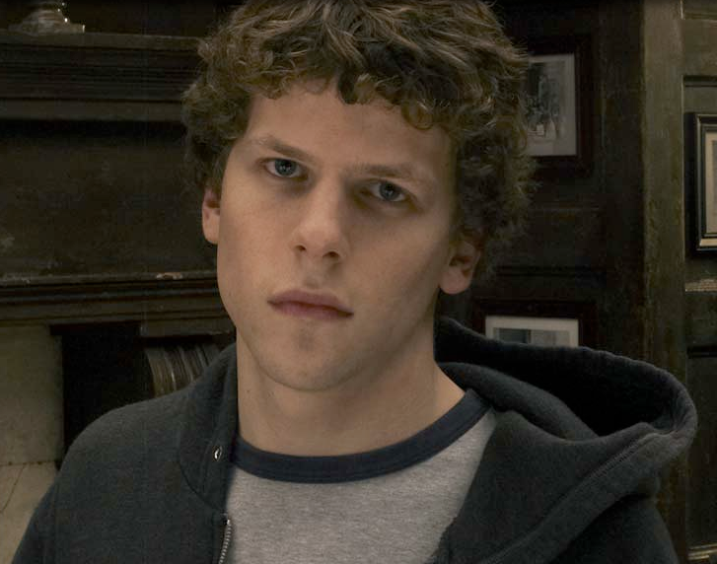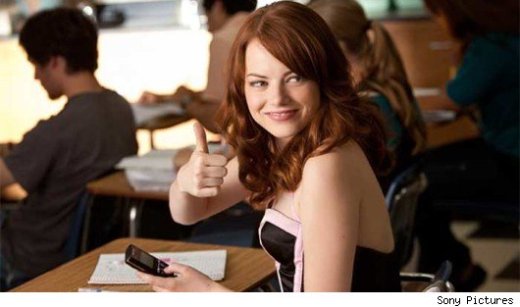Where were you during the spring of 2004? I, personally, was doing my final semester at U of Penn. One thing I did not recieve in my upenn.edu mailbox that semester was a miscellaneous e-mail (perhaps spam, perhaps not) asking me to join a social networking site called “thefacebook.com.” This is relevant because, during that particular spring semester, undergrads at some other Ivy League institutions (Harvard, Yale, Stanford, Columbia) were receiving such e-mails. The phenomenon of “Facebook,” a social networking site which has revolutionized (for better or for worse) how people socialize (in America and elsewhere) was under construction then. The 2010 movie The Social Network tackles this fateful moment in the history of the Internet and the technological revolutions which are shaping the twenty-first century. At the center of the action, of course, is Mark Zuckerberg (Jesse Eisenberg), a Harvard sophomore and computer programming genius. It would be difficult to say that the Aaron Sorkin screenplay portrays Zuckerberg as anything but an anti-hero: he’s jealous, vindictive, arrogant, and ruthlessly competitive. The movie also isn’t strictly about the American Dream; after all, Zuckerberg is a child of privilege about to become even more privileged.
What makes Jesse Eisenberg’s portrayal of Mark Zuckerberg so compelling is that Zuckerberg is also fiercely intelligent, good at repartee, attractive to look at, and so massively driven that he radiates raw charisma. The two other main characters, Eduardo Saverin (Andrew Garfield) and Sean Parker (Justin Timberlake) are more than foils for Zuckerberg; they represent two distinct American archetypes themselves. Eduardo is warm, very human, but too trusting; the big knives are reserved for him. Sean is the quintessential corporate hustler; stylish, attractive, grandiose, but not particularly human or sympathetic. Sean is, in fact, the corporate West Coast personified (and an undercurrent in the film is Harvard meeting the West Coast head-on). Part of what makes The Social Network potentially an American classic is that we see these three figures both at work and at play; from Case Equity to bong-hits. They’re fun to watch, specifically because what they’re selling is young, fresh, sexy, and bankable. The idea which is threaded through the movie is that Zuckerberg is socially debilitated; and, as the end of the film makes clear, he never (unlike Eduardo and Sean) gets the girl. As the movie ends, we hear the Beatles track “Baby You’re a Rich Man,” and we are compelled to decide whether we consider Zuckerberg, monied but isolated, a rich man.
The supporting cast, from those Zuckerberg ruthlessly plundered (like Cameron and Tyler Winklevoss) to those portrayed as corrupt American patriarchs (Harvard President Larry Summers), all turn in excellent performances around similar themes: how privilege begets more privilege, how the rich stay rich and grow richer. One of the few materially humble characters in the movie is Erica Albright (Rooney Mara), a BostonUniversity undergrad and love interest of Mark Zuckerberg who he decides to insult online and never particularly gets over. Zuckerberg has “privileged” quirks: with Albright, he cannot apologize. Nor can he apologize to Eduardo Saverin. For all intents and purposes, The Social Network portrays Mark Zuckerberg as an attractive monster. But that he’s not simple, not one-dimensional and, to a thoughtful audience, loses just as much as he gains, redeems The Social Network into a movie which can be intellectually respected in a way that few movies in 2012 can. What’s standing between The Social Network and classic status is, to my way of thinking, just time. Even as I forgive Zuckerberg for what was missing in my in-box eight years ago.
Adam Fieled, 2012

